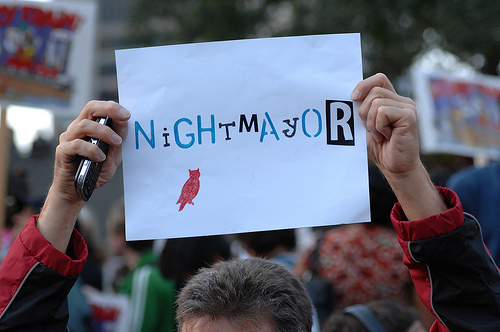Cultivate Canada’s media. Support rabble.ca. Become a member.
The Rob Ford story is not really about crack or poor leadership — it is a story of systemic privilege. Although privilege operates on many levels — personal, interpersonal and cultural; systemic privilege is perhaps the most dangerous form.
When we grant special benefits to individuals based on their social location (race, class, gender, physical ability, sexual orientation) rather than their competence and character, we not only set these individuals up for personal failure and a lifetime of “magical thinking”; we sign off on our collective demise.
Admittedly, I’ve been enthralled by each new chapter in this epic Ford drama but the narratologist in me fears that this is a distraction from the real story. What if the Ford drama is a smaller representational story highlighting the pervasive issue of systemic privilege in our society and specifically in Canadian politics?
In many ways we are all feeding into a system that has done Rob Ford and others like him a grave disservice. Just think of the number of public officials, celebrities, religious leaders, coaches and aspiring Reality TV “stars” who have crossed the line without appropriate social admonishment or reprimand. Although privileged people have always had greater access to resources, shaping important discourse and avoiding consequences for bad and even criminal behaviour, never before have they had such a public platform and audience. We’ve moved from condoning and accepting a certain level of privilege to outright celebrating it through our tweets, status updates, blog posts and candid Instagram snapshots. For Rob Ford and other privileged people, this is very dangerous. The combination of access, an audience and exemption from consequence has created what I refer to as “magical thinking.”
This kind of “magical thinking” is not associated with spiritual belief nor is it what many scientists would refer to as irrational ideation. It is also not the kind of hopeful thinking, which helps individuals transcend difficult situations or imagine a better world. These forms of magical thinking can be wonderful and have proved beneficial in various contexts.
The “magical thinking” I’m talking about is the kind of thinking that engenders a sense of unhealthy entitlement, questionable judgment and lack of accountability and reflexivity. We’ve all experienced the emergence of this form of “magical thinking” — students fresh out of university immediately gunning for senior leadership positions, vocal competition contestants who can’t hold a single note and desperate housewives who clog up the airwaves with vacuous bickering. For the most part we are accepting of these kinds of magical thinkers fancying them entertaining and comical. However, there is absolutely nothing funny about publicly elected officials like Rob Ford who are struggling with privilege and “magical thinking.”
While we’re entangled in Ford’s DUI charges, domestic affairs, conflict of interest claims, poor social etiquette, radio show ranting and allegations of drug dealing, important City business is not being adequately addressed. As a world class city undergoing a number of changes, Toronto is dealing with a plethora of urgent issues such as improving public transportation, developing affordable housing, mitigating the poverty/prosperity gap and safeguarding our environment. Clearly the Ford drama is a distraction, diverting time and energy from these urgent issues.
But make no mistake, Ford is not alone.
Consider recent political debacles precipitated by the actions of privileged magical thinkers entrusted with the public’s welfare — the messy e-health affair, infamous multi-million dollar air-ambulance service Ornge scandal and recently the senators who stuck Canadian taxpayers with almost 200,000 of inappropriate housing claims. While Ford may be an easy target and compelling character; his story is just one of many, linked to a larger metanarrative exposing the growing number of leaders whose “magical thinking” has led them to negate their accountability to the public.
You see if Rob Ford decided to spend his time and talent working for his family’s successful label company, he could exercise poor judgement and “magical thinking” all day long. Heck, he (or his brothers) could even deal or smoke a little hash on the side. However, as an elected official he is required to check both his privilege and “magical thinking” at the entrance of City Hall because he works for the 2.5 or so million people living in Toronto. The problem is that privileged people rarely develop the skills and insights required for being accountable — to themselves and others.
And why would they?
As a society, we’ve overempowered these individuals by turning a blind eye to their infractions and, in some instances, crimes; we’ve stroke their egos by propagating their mini dramas through social media and other communicative channels and we continue to perpetuate privilege by tolerating behaviour that would never be acceptable for the vast majority of us.
With the recent disappearance of the alleged video and Ford’s late but adamant denial, we may never get to the bottom of the latest chapter in this story. But perhaps that’s not what’s important here. Like many fellow Torontonians, I truly hope that Mayor Ford will step down and seek the help he needs. At the same time, it is important for is to remember that his story is just one of many unfolding in a system that abuses our trust and tax dollars to perpetuate privilege and “magical thinking.”
So rather than standing in glass houses throwing stones across partisan lines and making a spectacle of a mayor who is clearly in crisis; let’s think of strategies for holding our publicly elected officials to greater levels of accountability and excellence.
Jay Pitter is a senior marketing communications specialist and narratologist. With a Master’s Degree in Narrative Theory and Methodology, Jay investigates “story” as a communicative mode, data, art form, economy and social discourse. Her writing credits include CBC Radio, the Toronto Star, Walrus Magazine, Spacing Magazine, Fireweed, Sister Vision Press, TVO and the book Climate Change: Who’s Carrying the Burden?
Photo: postbear / flickr



